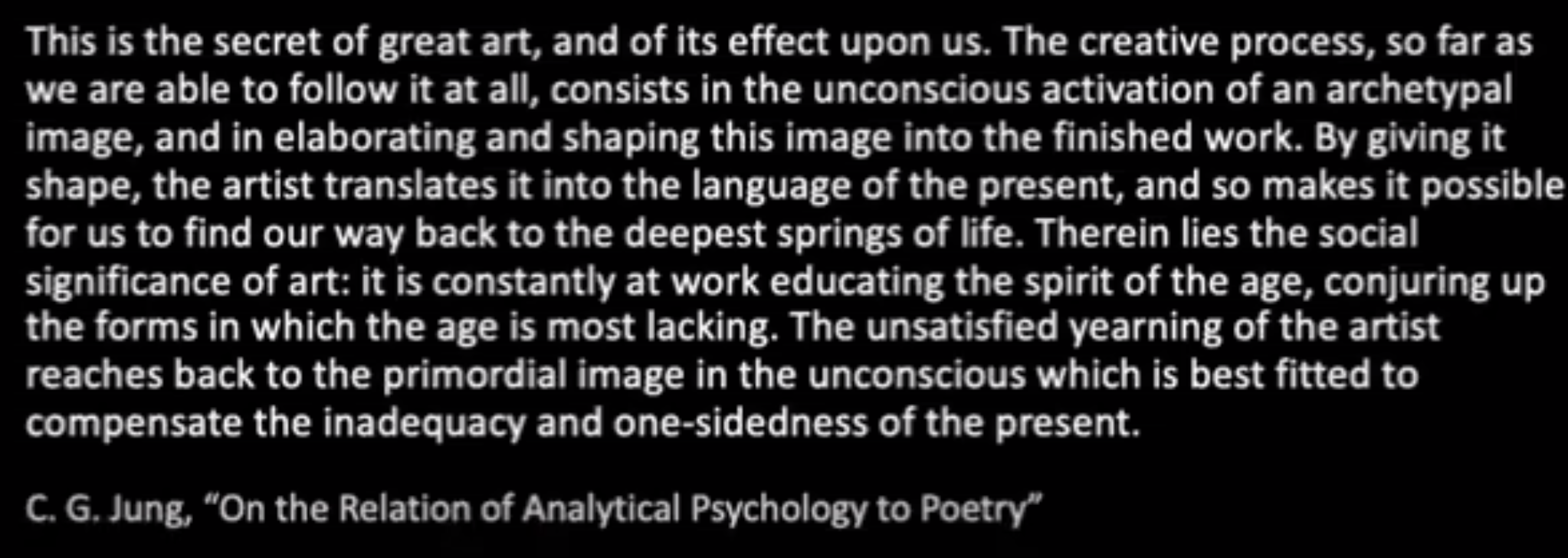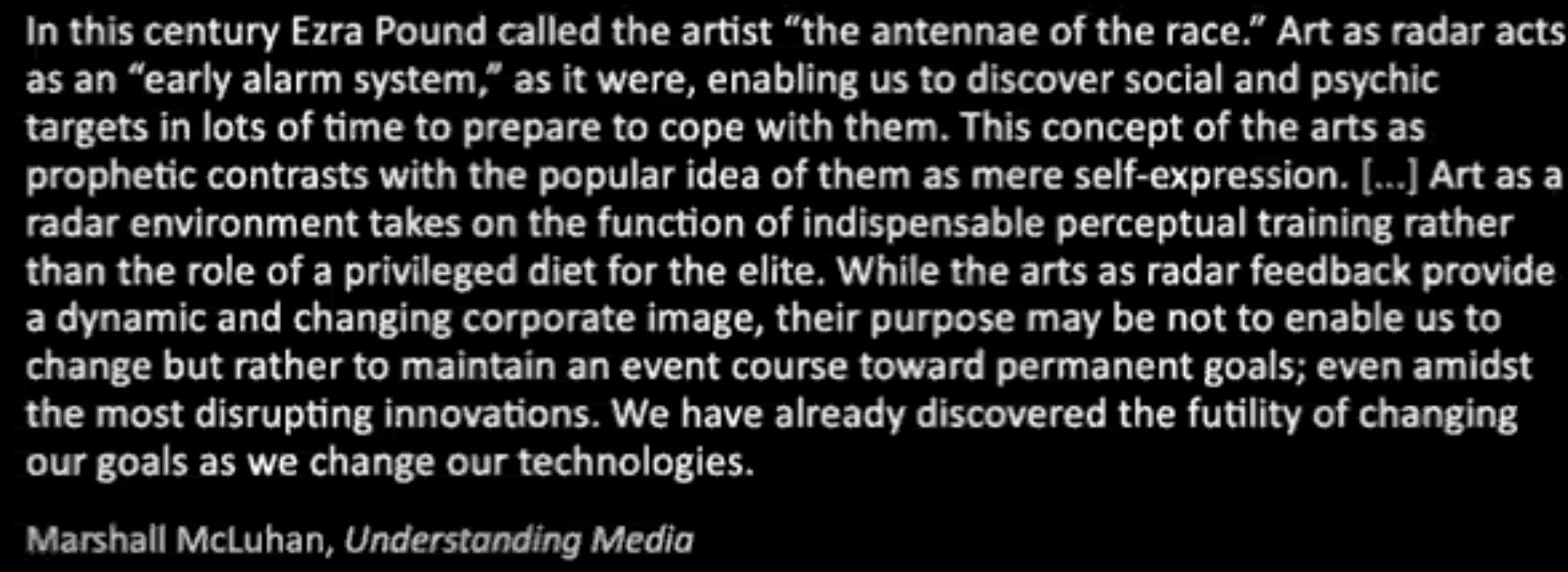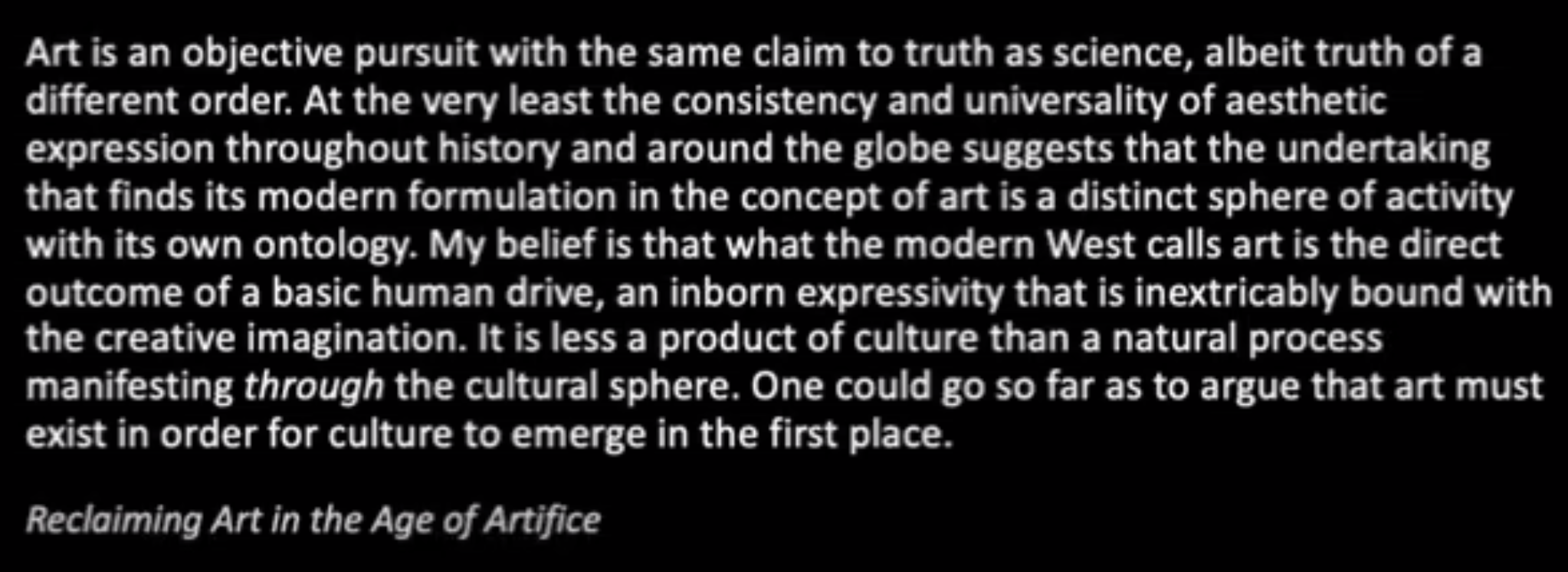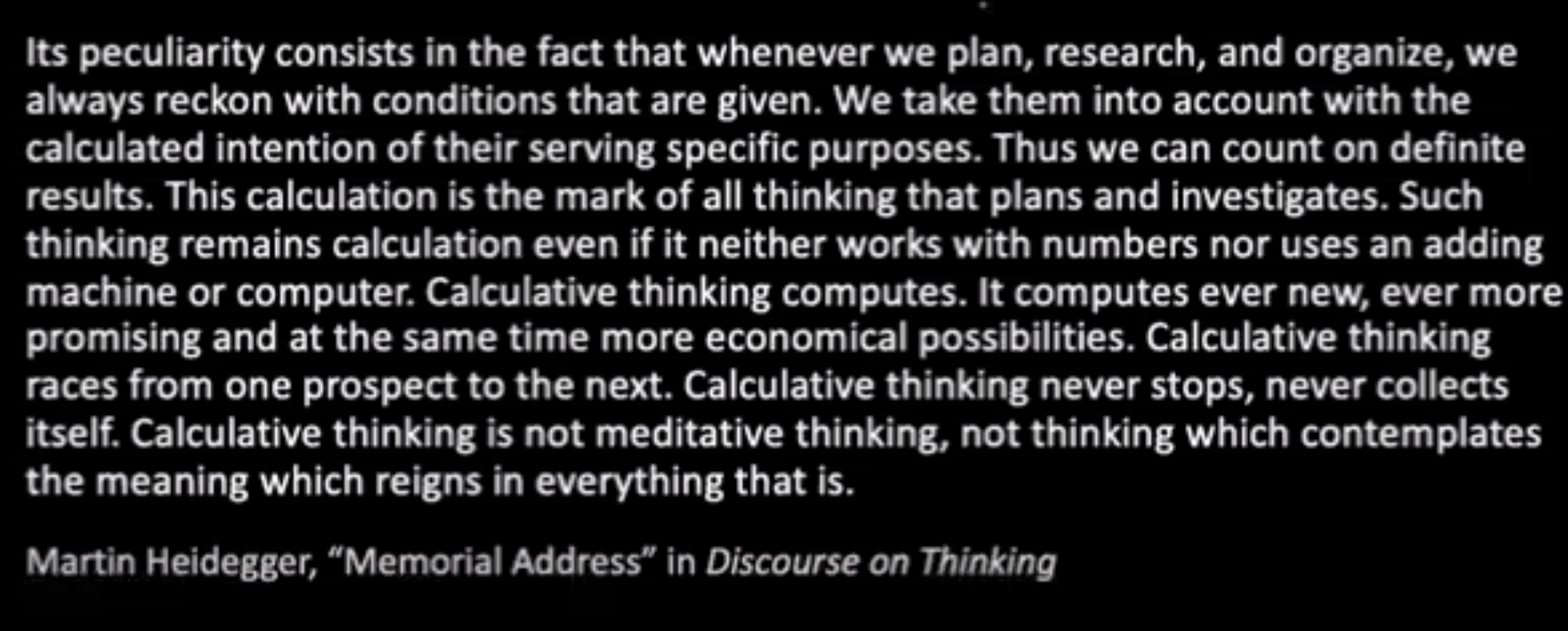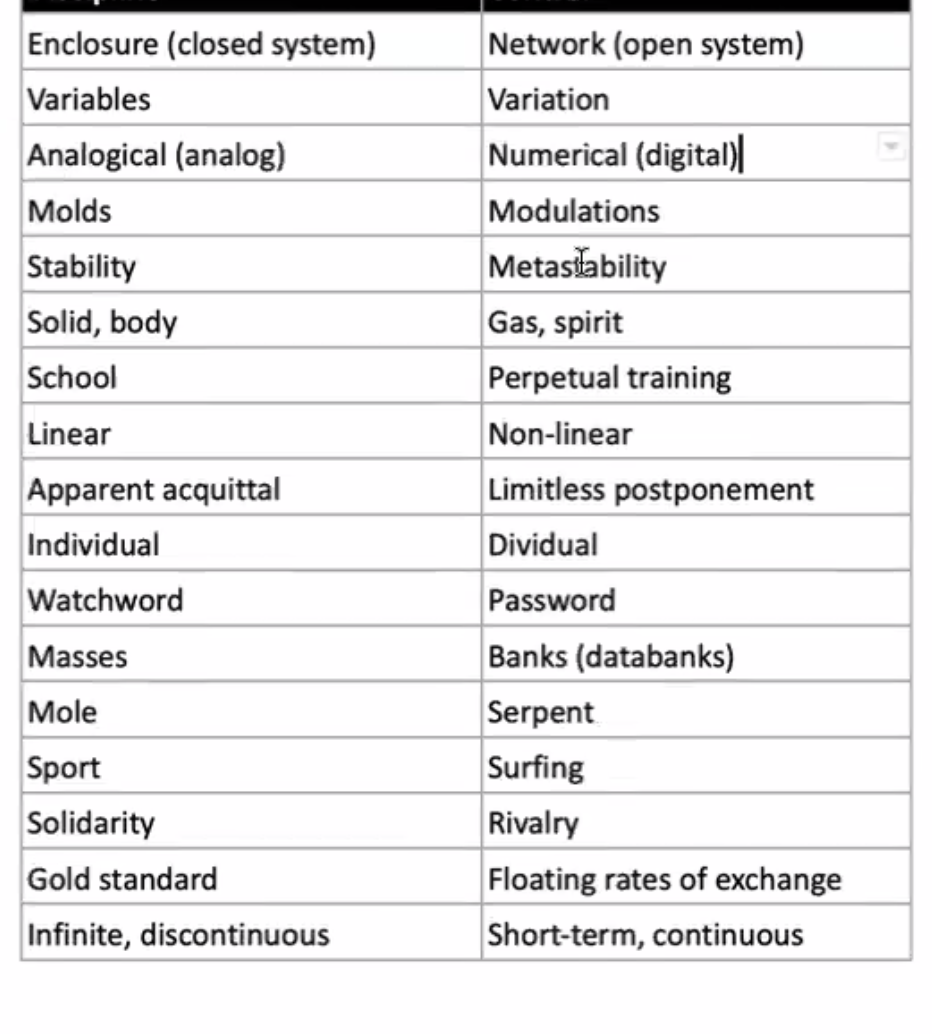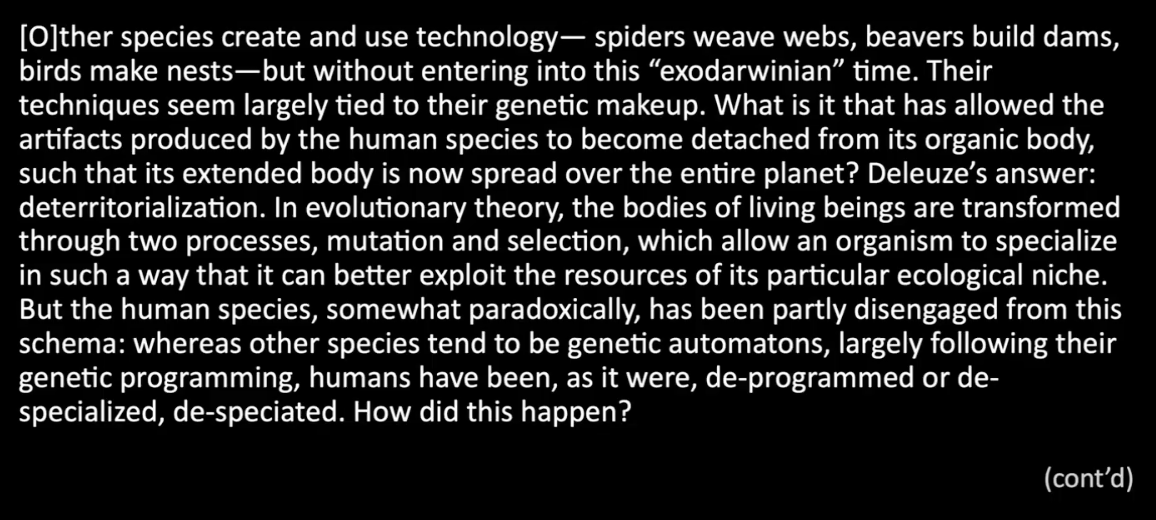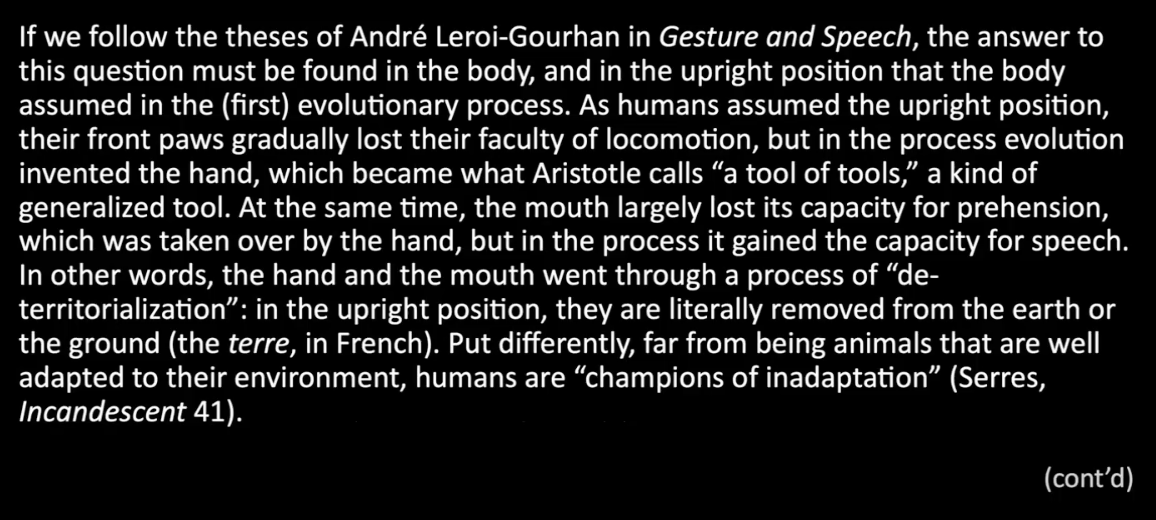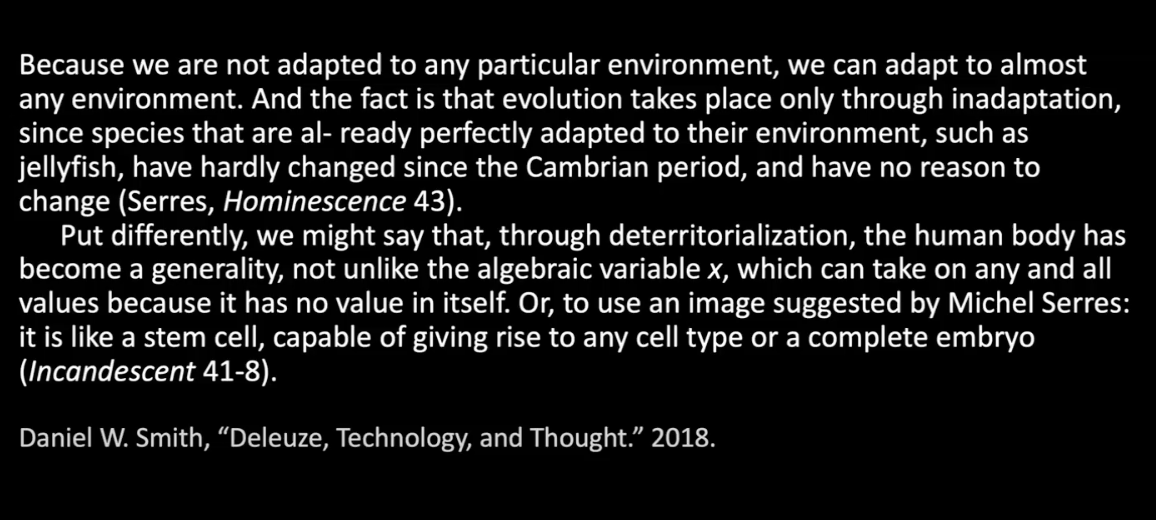Weird Studies/Courses/AI
25 Jun 2024 - 25 Jun 2024
Week 1
Reading: Emma Stamm, The Digital Image of Thought
- Deleuzian. Different "images of thought" (Plato, Heidegger, Descartes). OK. Thinking of Minsky and SOM as another.
- Plane and image are both background (?) but different:
- > Neither plane nor image present themselves positively in thought. They are distinguished from one another by their effects: whereas the image of thought preestablishes the range of thought’s positive andrecognizable forms, the plane of immanence serves as thought’s container and connective tissue.
According to Arkady Plotnitsky, images of thought realize themselves in scientific processes. His essay “The Image of Thought and the Sciences of the Brain” describes their influence on the disciplines of neuroscience, psychiatry, and psychology (Plotnitsky 2010).
- OK, then goes into the "digital image". My first reaction (before reading the piece) is that this isn't quite right because digital is a technology, not a substrate, and it permits a wide variety of different forms of "thought". It's akin to typography perhaps, or electronics, but even more variable.
- Esthetics of discreteness. This sounded like promising BS to me... Stiegler, Galloway, Tinnell. "to digitize is to atomize and, in so doing, ineradicably alter the subject of digitization". Well all representation does that. This reminds me of the vinyl-vs-cd wars.
- McQuillan on data science.
Locating truth as exterior to the subject, data science and Platonic thought both treat the vagaries of human interpretation as a barrier to their object. Per McQuillan’s argument, data science reinforces the Platonic vision which unites truth with totality, objectivity, and goodness, and discounts the value of the subjective and particular.
- Well yeah that is how science works (not just data science), but it doesn't necessarily mean devaluing the subjective for purposes outside of science. Also seems wrong, data science is not about totality and objectivity except as limit points -- you are always aware of the insufficiency of data to capture all of reality.
- Section . Representativeness and difference in itself
- ??? totally lost here, sorry
The digital mandate to representation seals off all terra incognita.
- No it does not. Wrong. Level of abstraction mistake. Same arguments made against writing or alphabetization.
Because the digital image of thought idealizes representation, it heeds no limit to that which may be reconstructed in digital and mental formats.
- Hm I do not understand what she is saying. Digital thought does indeed "idealize representation", that doesn't make it limitless, on the contrary, the theory of computation puts hard limits on what can be represented.
Its effect on thinking may be likened to the infinite scroll, a web design technique which automates the renewal of content as one navigates across a website or application. The infinite scroll presents figures at an instantaneous pace that preempts the mental production of difference in itself. The thinker always remains within the remit of its offerings, which is to say that they cannot help but acknowledge its endless procession of prefabricated forms. The image’s relative infinity is taken as absolute, as no lines of flight are available to carry the thinker away. Computers “think” or yield information in this manner, as their outputs are indelibly linked (however contingently) with inputs.
- Alright I'm going to call BS on this, at least the last part, that stuff about inputs and outputs is just nonsense. The rest...well, I want to say, infinite scroll is not a property of "the digital", it's a particular UI design used by capitalist enterprises to achieve capitalist ends. .
- Realizing something, that for most people "the digital" means "the internet from 1995 or so". That's what they grew up with, the consumer internet, not the science machines in university laboratories. I'm a relic of an earlier era.
- cites Psychopolitics by BCH really should read that, although sounds like I might hate it for these broad generalizations about "the digital".
- Some stuff on the materiality of computation which, yeah, OK.
- Going to tear into these 2 pgraphs:
These features have made digital information valuable in every conceivable sense. Digital capitalism is at least as dependent on the material world as the economic systems that predates it.
- Yes, but not news
When data are able to move quickly, accumulate without measurable limit, and take on seemingly endless guises, they are ideally equipped to contribute to an economic system which presupposes limitless expansibility.
- The characteristics of the digital are indeed of economic value but I don't know what "presupposes limitless expansibility" means. There's the general problem of capitalism and the digital fits into it quite naturally, I guess.
Their speed and modularity, which accounts for their economic value, is an effect of their immutable structure. In computer systems, this structure functions as a template for information processing. As an image of thought, it delimits mental activities in compliance with the technical requirements of computability.
- OK what the fuck is this saying? Digital data does have structure, although it isn't more or less mutable than anything else. And yes computer systems take advantage of this structure (you could say something even stronger; they create and maintain this structure, that is kind of what they are for). But "as an image of thought, it delimits mental activity" is BS, sorry. Computation may or may not be a good model for thought but it doesn't "delimit" anything (I think, I am not sure what "delimiting" means, but it sounds like "limits").
The relationship between the rigidity of data and the malleability of digital media may appear as a paradox.
- Entirely self-constructed, there is really no mystery about the nature of digital media, no dark secrets or paradoxes.
Yet the conceivable breadth of digital outputs does not exceed that of pen, paper, and other analog means of production. What distinguishes the digital from the analog is not the former’s range of expression, but the extent to which it is taken as a faithful bearer of the real.
- Analog photography had this problem, it was too real and upset art people. Somehow we survived.
Computers are granted the capacity for verisimilitude by the structural inflexibility of the datum.
- Say what?
As a precursor to human thought, the digital image would endow minds with the ability to function as virtually inexhaustible wellsprings of concepts. The currency of these conceptual outputs accords with the degree to which they accurately capture the external world, and their valorization transforms thinking minds into workers par excellence.
- Wait the digital image is a precursor to human thought? What can this mean. The notion that accuracy turns us all into robot slaves seems wrong. I guess what she is against is not computation but objectivist epistemologies? I'm OK with that, but also that computers are guilty of promoting them? Not quite as down with that part.
- From the conclusion:
To characterize machines as “intelligent” is to conceal those aspects of mentality which cannot be translated into economic value. My presentation of the digital image of thought mobilizes Deleuze and Guattari against this campaign of obfuscation.
- Alright, well, that's clear enough at least. But it confuses the materiality of machines with their economic roles. An understandable confusion but one I reject.
The fact that [Turing's] prediction has proven true does not render the figure of the “thinking machine” any less absurd.
- Well OK now we are clear where we stand anyway.
- Cites Data Science as Machinic Neoplatonism | Philosophy which mentions "Karen Barad's idea of agential realism which I guess I should know about.
Reading: Erik Davis
For my part, I can’t imagine why anyone with real power over AI wouldn’t slam on the brakes so that we can try to integrate these extraordinary technologies at something approaching a normal mammal pace
- I liked everything up to this point – this won't happen because capitalism, basically.
With Altman, as with so many in this biz, the computational bias of computer engineering has bloomed into a totalizing psychology. As the CEO put it in a famous tweet, referring to Emily M. Bender’s critique mentioned above: “I am a stochastic parrot, and so r u.” In other words, our brains are just running algorithms, making statistical guesses, and generating predictive processes that compose our reality almost entirely from the inside
- This too I take some issues with. We are algorithms, but better ones than LLMs.
First lecture
The prophetic power of art
- What is art? The means by which people give material form to imaginal reality. Get away from media-specific definitions. "The arts" are where imagination has taken refuge in a disenchanted age. Religion is made of art.
- Art is engaging with the imaginal.
- [not sure I should publish these]
- interesting bit about permanent vs. temp goals. Need to think about that.
- "Humans didn't invent art, art invented humanity"
- art:
- empirical, (but transcendentially empirical? ).
- compensatory (about stuff which is ignored or repressed, neglected, off the radar)
- and hence political (in the same way the Alps or the Meditteranean)
- adumbrative (prophetic) because attuned to the large forces moving through time.
- Instinctual, precedes culture, as natural to humans as pollen gathering is to bees
- artifice:
- whereas art is a result of plunge into the imaginal, artifact is cultural production which presumes a closed world.
- Google Earth as a great product of artifice. (Eh)
- Maybe a boring mystery or other genre book. Superhero movies, jingles, road signage, propaganda, pornography. Deals in signs, not symbols.
- Signs are symbols with fixed meaning, seen from only one side, sort of dead rather than alive (that's my take, not JFMs)
- "You don't compute a new idea" – question-begging IMO
- What does your phone feed you? Artifice, even if you are watching Ingmar Bergman (why? and what about this class?)
- Heidegger on thought – against "calculative thinking"
- (must drop a Heideggerian AI ref)
- meditative thinking as a thing, a practice distinct from Zen-style meditation. Glassenheit, openness to mystery.
- Weirding as an attempt to put this kind of thinking into practice. Not to come up with great ideas but attend to things so ideas will manifest.
- AI baked into the very notion of machine
- Macbeth prophecy of "not of woman born" a presagement of AI
- Rudolph Steiner, Lucifer and Ahriman lectures
- 2 different demonic intelligences. Steiner says Lucifer incarnated on earth, in china(?!) leading to gnosticism etc. Lucifer wants "to get us out of matter", spiritualizing, world-denying.
- Ahriman from Zoroastrian principle of evil. In 1919 predicted he would incarnate after the year 2000. We are being groomed for his arrival through technology. Ahriman wants to stop spiritual life and drag us back to quantity or number.
- Mentions Kevin Kelly and the Technium
- Artificial Intelligence may be the oldest force humans have dealt with, but coming now in a new form.
- The inevitablity of AI makes his moral judgement irrelevant, even though it presents an existential threat.
Art, artifice, and thought
Adumbrations of AI
The challenge of generative AI
Questions?
- Art's prophetic power can be explained without supernaturalism, because art guides us in the actual construction of the future.
- No Country for Old Men – definitely art, but I would say its meanings are fucking crystal clear, the characters explain themselves.
- What does your phone feed you? Artifice, even if you are watching Ingmar Bergman (why? and what about this class?)
Week 1 office hours
- LLMs do not implement Cartesian subject/object thinking, or really anything like it. That is not their problem, it’s kind of the opposite, they don’t have enough agency to be actual subject, which is why they freely make stuff up.
- The “inevitability” is a political argument, IMO. I dropped a note on the Nura comments about this, but half of “AI” is just capitalism, especially its inevitability. It’s saying the technium is beyond human control. This may be true but it’s a function of politics, like nuclear weapons, we could control them if we governed ourselves better, but we don’t.
- Margaret Warren presented Don't Sleep There Are Snakes and DataPerf - Adversarial Nibbler
- JFM "pretty on board with Chomsky" – huh
Week 2
Lecture
- The prophetic power of art.
- Discourse surrounding AI
- Doxa and episteme. Doxa is common knowledge, episteme is "of the form", high-falutin stuff that is.
- Deleuze emphasized that episteme are created, not merely discovered. Creating tools, abstract machines (I like)
- 3 AI doxa - all share the property of stopping the conversation. Opinions aim at silence
- Mere mimicry, not intelligence
- Neutral tools
- NRA fallacy. Tools crystallize intentions (I think he's pretty right on this one)t
- tools vs machines (eh)
- Evolutionary destiny
- JFM does not accept, he thinks machines are a rift in natural history.
- Guattari – machines are abstract entities, diagrammatic (?). "Machines do not belong to causality" eh,
- A wish is acausal. Machines are an answer to a wish. Supernatural, not natural.
- Imaginal ≡ acausal I don't buy this

- argh
- The plagiarism thing is a red herring (IMO)
- Anti-mechanism. Dismissive of reductionism becasue it implies conscious doesn't exist. Bergson story. He believed cinema was bad because false theory of movement. Intellect should be subordinate to instinct, which better apprehends reality.
- Deleuze wrote book on cinema that disagreed.
- JFM – intelligence without subjectivity can be real.
- AI from the inside (Hm)
- Information is for command inputs (no). information presupposes an outcome (no, actually the opposite)
- Information presupposes fungibility (ok)
- Deleuze: art does not communicate, it has nothing to do with information...
Prepping a comment
- Weizenbaum
- False dichotomies drives me crazy.
- Your meaning of "information" is wrong (or, at the very least, confusing). You said something like information always has a goal, is manipulative. Opposing it, I think, to some more genuine form of communication. Machines exchange information, people do something more, they relate, they are capable of an I-Thou stance. OK, but they don't differ in their manipulativeness. Or are w assuming machine purposes are lower than human purposes?
- My point was not to argue the facts but register that my intuition is different. Information suggests static bits to me, it is less manipulative than human speech which is always loaded down with vast quantities of social purpose.
- Sorry what was the point of this?
Reading: Deleuze, Postscript on Societies of Control
- Who is controlling who?
- Link to The Limits Of Control
- Below the API
Jobs increasingly fall into one of two categories: Either you tell computers what to do for a living or they tell you what to do.
- Sent:
- Undeniable that we have been moving in the direction of more control and finer-grained control. It's not exactly a conspiracy against the individual, more like the necessary mechanization of society as it scales up. Driven by (?) capitalism, modernization, urbanization...Napoleon?
- Computers have been a big part of that, it is more or less what they were invented for and what drives them economically. However: there's always been a strain of computational research that wants to use the technology for more human-centered ends. Douglas Engelbart, the early visions of personal computing, and the free software movement are three examples of this strain, and I only mention them because I'm trying to remind myself what I got into this stuff for.
- AI has its own dream history, not particularly about control in Deleuze's sense, but the current form of AI (LLMs) is peculiarly suited to capitalist centralization and thus control.J
- JFM: makes more sense if you translate "analogical" to "analog" and "numeric" to "digital".
- Discipline vs Control
Week 3
Lecture (async)
- The Technium. Get to the heart of technology (we'll see). Condition of emergence of AI: Technium, Society of Control, Metaphysics of access (aka ethos of suspicion).
- Technium: material and digital infrastructure. That we live our lives in. Arcology trope from SF.
- Have they read The Machine Stops?
- Kelly's notion of technium as superorganism. A single system.
- Around 13:20, JFM twist, he views the technium as a kind of alien imposition, I don't think KK does.
- He takes tool as autonomous... "exodarwinism" that is a good word. (French dude?)
- Society of Control (necessary to get the data for "Ahriman's preserving jars")
- Google Earth and Books as example. (might be worth mentioning internet archive). But those don't really have anything to do with control of individuals.
- Some misunderstanding of cybernetics. A classic steersman is outside the system, but cybernetics puts the control inside and automates it (and that is somehow bad?)
- Quotes JCR Licklider about man embedded in system. Doesn't really grasp the intent I think. Relates it to Deleuze as man imprisoned.
- "man embedded in the technium" – wrong metaphor.
- "the cybernetic ideal of control" – misconceived I think
- from knowledge as power to data as money (fungible power)
- Lick on "supercommunity" – Ahrimanic (Not really)
- Metaphysics of access
- a necessary metaphysical attitude, or ethos, or mood of thinking. Tristan Garcia, "philosophies of access exchange objects for the conditions of their annunciation" (whut)
- OK Garcia is lumped with OOO and speculative realism, I never could figure out what that shit was about.
- I don't need to know that my wife is made up of atoms.
- i guess this is pretty vanilla antireductionism
- naive realism (rejected by all modern philosophers)
- recalls that marvin clip, I think this one
- Nietzschean perspectivialism -reduction to will to power. Similar with Marx. Freud of course. "masters of suspicion" (should google that)
- he is not saying it is right or worng but that it is necessary for emergence of AI (not sure why)
- "turns the human into an object of study" well yeah.
- Technology and the Human
- Angels: pure form, beasts: form and matter
- every angel is its own species (interesting)
- theregfore angelic ≡ digitial (????) beasts are analog a
- angels are not comparable to anything else.
- ah so humans are beast and angel analog and digital
- some confusion here but I can't untangle it
- Ah he says explicitly that tech is different from nature (spiderwebs etc)
- Deleuze technology and thought
- oh interesting "deterritorialization" as removing from the earth aka ascending to heaven.
- More anti-reductionism. Eh. Around 00:53
- Hammer different from spiderwebs, require an ontological leap. Showed 2001 manape clip (didn't show the jump cut). Monolith as rift, as acausal something, inexplicable. (I wonder what Minsky thought of that aspect of 2001). Emergence of ought from is (?). OK he likes to emphasize the discontinuity. I must say I don't, but is that just a matter of taste?
- Manticore example. Ah he explictly sneers at the default notion of imagination as in the head, private "an epiphenomenal fog supervening on material reality". I am not sure what the point of this is, this insistence that imaginateion is real. I mean, sure, in some senses, but why is this such a freaking big deal?
- imagination vs imaginal world, the world in which all possible things exist. The imaginal world is digital because things in it are not composed (eh).
- Tools all come from the imaginal world (?). A hammer is both physob and image of something. This is why tools have a telos. Eh.
- He's working towards a partial equating of art and technology, OK.
Thu class (on tape)
- JFM: wants to get away from stale Manicheism. OK.
- Very confused analysis of analog v digital photography. pan vs. echo
- analog is same as mirror (or similar) but not a representation, part of a causal process, on the same ontological plane (OK I think I know what he is trying to do, but it is wrong).
- With digital, more of a rift in representation.
- When superman looks at a 4K hi-def image, he sees something low-res like 80s Donkey Kong.
- what was that a response to?
- JFM is a hardcore Humean! Huh. Not sure what that means. Ought/is distinction implies nihilism, maybe? Story about Hume and the peasant woman.
- Margaret on analog/digital: she equates angel and analog. Digital is impure. JFM explains angel/beast .
- Angel: intelligence, not found in animals. One of its powers is to create counterfactual universes (imagination). JFM is getting into category theory! Blowing his mind.
- Angels are also unique, purely formal. Just a way of thinking – a good model for thinking digitally.
- So we are analog creatures with digital minds, the digital is angelic but not that great?
- Stressed that a and d are both worthy aspects of reality.
- Dyad vs binary. The mole and the snake. Snake represents the digital (from Deleuze?) Mole is enclosed, snake surfs on the earth, the snakes coils are more complex than the burrows of the mole.
- Jeremy (Chomsky) colleague, did work on mathematical linguistics, NOT a programmer. Mentions Minsky (offhand). Works at OceanNet (?). AI as experimental epistemology (after Hofstadter). He agrees with Chomsky, "nature is fundamentally computable". A program is a theory, a thery of mind in the case of AI, so philosophical. Quotes chomsky on humbolt – the infinite use of finite means (?). Some of his explanation of Godel seem cheesy, but I guess ok for the context.
- Echoes some on uniqueness of imagination. I think I disagree with this – dogs and cats can imagine future states of affairs. It's more language that distinguishes humans. Some refs to Leibniz but what do I know about that, nothing.
- Some people take LLMs as refutation of Chomskyian theory. He takes their lack of grammar as evidence they aren't really intelligent. LLMs radically empiricist, not rationalist
- Chomsky becoming something of a Platonist/pythagorean in old age. Their book somehow shows how this leads to the imaginal? Sounds interesting. Albeit vaguely braindamaged.
- Heraclitus was a Chomskyan avant la letter??? Hm. Both believe in a kind of transcendential logic.
- Around 37:00 he is almost a monarchist reactionary. Charles Taylor immanent frame
- JFM Mentions Heideggerian AI Dreyfus paper
- Kants theory of desire (imaginal)
Readings
Chomsky NYTimes piece,
- LLM-skeptical for decent enough reasons. More AI-friendly than you might expect, he even refer's to "the child's operating system".
Unlike humans, for example, who are endowed with a universal grammar that limits the languages we can learn to those with a certain kind of almost mathematical elegance, these programs learn humanly possible and humanly impossible languages with equal facility.
- There's a paper: Priorless Recurrent Networks Learn Curiously | Semantic Scholar
While scientists certainly seek theories that have a high degree of empirical corroboration, as the philosopher Karl Popper noted, “we do not seek highly probable theories but explanations; that is to say, powerful and highly improbable theories.”
- Interesting
True intelligence is also capable of moral thinking.
- I suppose. What's so special about moral thinking? LLMs problem is that they don't think at all.
- The example of the AI explaining how it has no personal perspective is kind of weird and creepy.
Note, for all the seemingly sophisticated thought and language, the moral indifference born of unintelligence. Here, ChatGPT exhibits something like the banality of evil: plagiarism and apathy and obviation.
- interesting. Was Eichmann not intelligent? I mean, he may have been a moral idiot, but he seemed to function OK (for some definitions of OK) without a well-developed moral sense. But OK, there is some connection between intelligence and morality, and the idea of an amoral intelligence divorced or independent from morality (as in paperclip maximizer ) has something wrong with it.
- Summary: I guess I mostly agree with this article but don't think it makes a great case against ML. Gary Marcus or Chapman go deeper.
excerpt from the 25th hour
Of the laws governing the mechanical slaves, I will menIon only three: automaIsm, uniformity, and anonymity
We are learning the laws and the jargon of our slaves, so that we can give them orders. And so, gradually and impercepIbly, we are renouncing our human qualiIes and our own laws.
- Personal reactions: well, you know, "machines" aren't like anything, except as how humans design them. This kind of story is very trite, actually – from Terminator to the Berkeley Rationalists, everyone is terrified of a revolt of the machines.
Week 4
Lecture
- Art and technology both about making the imaginal real. Are they the same? (No).
- Review of "imaginal" – the imagination is not subjective, put perceptive, we observe a real imaginal world, which includes all possible worlds. The possible is part of the real. Real and unreal possibilities are different (manticore vs square circle).
- The past subsists in the present (but it is imaginal as soon as it is past). The future "insists" upon the present (?). Deleuze and Guttari in What is Philosophy use "chaos"

- digital/analog material vs imaginal cheese. Argh this seems braindamaged to me.
- Anti-Magrrite pipe.
- Hylomorphism (everything is a combo of form and matter). The form of cheese has to predate actual cheese (eh). Bjork Modern Things. Bergson, matter and memory, the ? image...oh this stuff seems so dumb.
- I totally tuned out when he started going on about tools and 2001. He seems to be desperately trying to prove something obvious or trivial. Tools have a telos (OK agree with that at least). A tool is physob and image (But what isn't?).
- Technology seeks the abolition of all causality (WTF). And minimizes body and maximilzes image (I guess true of media tech). The parts of the imaginal machine generate causality (WTF).
What is a machine
- "a systematic assembly of parts, each with a function that interact in predetermined ways to achieve a desired outcome" – OK, not too bad.
- This sounds wrong and stupid.
Leibniz felt that the moderns had erred in ascribing this godless model to life itself. He set out to restore the uniqueness of life by positing that infinity was its defining feature. For Leibniz, even in their smallest parts organisms were machines – and therefore were machines ad infinitum, akin to onions that could never be completely peeled. Leibniz
- Hm, Leibniz apparently invented the Chinese Room Argument (also dumb) Leibniz's Mill Argument Against Mechanical Materialism Revisited. I forget sometimes that stupid arguments about materialism have been going round and round for hundreds of years.
- "There are no fascists because we are in a society of control" – JFM , paraphrasing, I couldn't disagree more...
- Macbeth course was about time, this is about space (???)
- JFM: You can't start doing philosophy without. aconcept of time
- "teenagers smoking a joint style philosophy" – no shit
- "time is the present slipping into the imaginal" – hm. In a way he's right – we can't directly experience the past, we can only deduce it and/or imagine it.
- He's making an argument about the reality of the future that is close to my anti-freel-will stuff.
- What if the material is the infinitely imaginal...
- Stuff on doves made me think of
- Resisting this stuff...maybe I'll stop.
Reading
- Wargo on Giger. I liked this, up until
If there is an origin trauma in Giger’s work, I suggest it is really the trauma of origins in the ancient Gnostic sense: of spirits who find themselves born, painfully, even hopelessly, into the world of matter, with all of matter’s pains, frustrations, and limitations.
- But maybe I am a cozy traitor, counseling spirit to not feel so hostile toward matter, treat it as home rather than oppressive jail.
- OK this is just wrong
While the “fall of spirit into matter” seems like a purely theological or mythic narrative, it has an uncanny reflection in what has become the accepted, fully materialistic account of the origins of complex life forms on Earth. The theory, first proposed by the Russian botanist Konstantin Mereschkowsky in 1926 and then supported by the discoveries of biologist Lynn Margulis (below) in the early 1970s, is now entrenched in biology textbooks: Over two billion years ago, changes in Earth’s environment such as an increasingly oxygen-rich atmosphere led bacteria to adapt in new ways, including by merging and coopting each other, sharing their genes and unique bacterial talents. Through a process called endosymbiosis, independent creatures engulfed each other and “grew together”—most often, perhaps, pointlessly and painfully, but every now and then forming mutually beneficial and stable unions that shaped subsequent life. This was the origin of the first complex, nucleated cells or eukaryotes.
Margulis’s story about our merging bacterial ancestors is inspiring and cool … as long as you hold it at a 2-billion-year arm’s reach. Can you imagine the horror of being forced to live out your life immobilized inside another organism?
- Sorry, that is a stupid projection of human concerns onto single cell organisms.
- Talk of jouissance, I realize I have no theory for this. Seems bogus, but also useful? Like mental energy, or willfull play.
I am inclined to take Lacan’s jouissance as essentially the same thing—as spirit or consciousness, the thing that separates us from inert matter.
- Nut graf:
Giger’s world shows us this dark threat of cyborg endosymbiosis: not to be simply augmented by machines (or even simply replaced by them) but to be parasitized and engulfed by them in a kind of numbed ecstasy that somehow masks the violence being done.
Donna Haraway suggested that even to hope for such a choice could be a mirage, because we have always been cyborgs: Language, culture, tools, all act on and in the body so thoroughly we could never unplug from them.
- Yeah
- Recalls Blake
For Bacon and Newton, sheath'd in dismal steel, their terrors hang Like iron scourges over Albion: reasonings like vast serpents Infold around my limbs, bruising my minute articulations.
- Really recalls Swarm
Office hours Thu
- Maya Ward doesn't like Giger.
- JFM is platonist, or leibnizian or David Lewis (Plurality of Worlds). Forms precede instances.
- I got in my comment about Giger ≡ capitalism and what about human creativity?
- Some stuff on holism and final causes.
- Jeremy brings up Latour (but not sure which thing).
Office hours Sun (async)
- JFM claims Leibniz invented computing and he got the idea for binary from the I Ching, which is interesting... Leibniz: Explanation of Binary Arithmetic (1703)
- Tomberg: calculative vs meditative thinking. "with the drop" or "with the flood", or L/R dichotomy sort of. Brings God and omniscience into it, unnecessarily. Argh.
Week 5
Office Hours
- Playing cards and platypi. Reductionism.
- Some weird critque of reductions that it doesn't know when to stop? "you can take something apart forever" – eh no.
- Understanding the Eye doesn't require going all the way into quantum physics. Agree but so.
- That's what the imaginal is, the power of things to exist onm its own as a whole.
- And this "trnascends its existence as part of a causal system"
- "the power of cheese"
- ontological primitives. Used to be atoms.
- every whole is a miracle because acausal – ok, well, that is fucking dumb
- reality is two parts, a causal part and things as simply existing as they are.
- Rota on Husserl. Facticity and function. Fundierung as a bridge between the material and the imaginal (I would say they don't need a bridge, they are never apart). JFoster: framing out a facticity and making a symbol, anything can mean anything (sounds braindmagaged). NOT a mere affordance. Take x and make it AS something else. He is against pragmatism, sigh. This is the essence of real intelligence, the ability to see possibilities.
- Humans have more flex than animals. This is deterritorialization. We can invent/change roles/functions.
- JFoster: both platonist and empiricist. "you can be a total realist about the imaginal". He mentions multiworld physics theories, trying to be materialists about the imaginal. JFM: David Lewis, Pluarality of Worlds.
- JFM: anything that matters has to be real. Agree completely, but then he goes on about manticores and against a cognitivist version of imagination, a mere secretion of the brain. "Matter itself is simply a particular organization of imaginal reality". But why is that an argument for animal imagination? Argh. One of his cats is human. "A realist position with regard to the imaginal".
- JFM: wasps have imaginal knowledge of caterpillar anatomy (kind of wrong and undercuts earlier arguments about human exceptionalism).J
- JFM: against dualism and we are already immersed in it (I agree but h seems inconsistent to me?)
- JFM on divination and the I Ching, thinking with the flood. Similar to art. Jungian unconscious (not oppositional as it is in Freud). "In you is an infinite mind". "When you think artistically you are thinking with the entire universe". But not mystical, purely natural??? The conscious mind is a drop within the ocean of the infinite. D&G go into chaos, make friends with it, in order. toextract new principal. tointegrate into culture (hm).
- ChatGPT has. a trillion drops but not access to the infinite (not sure why, but he's still anti-AI here).
- Technology as junk in Star Wars and our lives.
- Art about recovering interiority (contrast with BCH on Zen)
Office Hours 2
- Once a tool comes into (material) existence...
- intelligence needs to be present in nature...film camets imshinsl, noy found in nature...
- pure image of film,
- LEibniz machine in all parts – frangly dont get it. God's infinite machine vs human finite machines. That's how animism works??
- LLMs overwhelming us like in King of Elfland's Daughter story.A
- JFM: Art fell off the spiritual path with Dada, by erasing line between life and art. Bad idea!
- Shannon Taggert, Patrick Harpur, neoplatonism and emanationism. JFM, trying to give uncoded philosophy (? purely out of the immanent, no ref to Kabbalah etc). JFM acknowledges he is rediscovering their stuff.
- Somebody brought up Abebe Birhane and "atemporality". Smooth places (airports, D&G like, JFM does not). Birhane wants humane technology, ack of human dignity...respecting the human and irreducible singularity.R
- Role vs function in Ulam Fundierung writing
- WS AI Course Continued
Proclamations
- I've had to miss all the live sessions this week because I am too busy serving the machines, but thought I would share this review of Kevin Kelly's What Technology Wants (the source of the term technium) I wrote some time ago. Not sure I would agree with it all today, and the issues I'm thinking about are somewhat different from the course topic, but thought it might be of interest. https://omniorthogonal.blogspot.com/2010/12/power-so-great-it-can-only-be-used-for.html
- I'll have to take another look at the book, but my impression is that JFM's take is quite different. Kelly's purpose is to describe a grand unified process of the emergence of everything, including biological life, human life, and technology, which are just different phases of the universe complexifying itself. JFM in contrast seems to be emphasizing the discontinuities between technology and nature. Technology is something of an alien imposition on humanity, something that comes from outside through a rift and wraps us in its systems. Especially digital technology. (Apologies if I am oversimplifying or just getting it wrong).
- They share, I think, a kind of view of "technology" as an agent or inexorable force. From within or without, it is coming for us, or already here and we live within it. That is perfectly valid, but it rubs me the wrong way for reasons I get into at the end of that review. Technology is not an alien imposition, it is a human creation. It's not something that was done to humanity but that humanity did to itself, and is still in the process of doing. If we can't control it, it is not the fault of technology, which for now has no agency of its own, but the fault of irresponsible human creators and control systems.
- Mostly when people assign agency to technology, it makes more sense to me if I substitute in capitalism. Unlike technology, it is clear and obvious how capitalism has agency, how it insinuates itself into human desire. Technology often is used as a tool of capitalism, but it is just a tool and can, we hope, be put to other ends.
- Unsent to thread from Avi
- I admit to having my own difficulties with the ethos of suspicion. I suppose I've been marinating too long in materialist cognitive science, but I have a tough time grasping how there could even be an alternative. "Direct realism" is not a theory, any theory (from Marx, Freud, Darwin, Nietzsche or J. Random Scientist) has to explain something in terms of underlying forces or dynamics or it isn't a theory.
- That is, it is not a scientific or intellectual theory. It's a perfectly fine theory for getting around in ordinary life, and indeed we use it all the time, we are obligated to. Our experience is made up of what appears to be direct perception, because the mechanisms underlying perception are not normally visible to consciousness.n
- Sorry, getting into science-asshole territory here, but the honest question is, what are the alternatives to an ethos of suspicion?
Statements
Mechanism: not all that bad
- A lot of this course, and WS discourse in general, seems based around a basic assumption that there is a hard separation between computation, mechanism, information, and algorithms on one hand, and human intelligence and consciousness on the other. People have a very powerful intuition that whatever they are, they are more than mere machines, and if they were mechanical it would be absolutely terrible.
- This is not just a WS opinion of course, it's pretty commonplace, almost everyone except technogeeks finds the idea to be some mixture of absurd, repellent, or alarming. Now that real AI seems, if not quite here yet, at least plausible down the road, people with that hard barrier in their ontology are challenged and confused. Some basic fixed assumptions do not seem so fixed any more. Sacred concepts like personhood are in the process of transformation, by forces that are barely understood even by the technical people pushing them forward, and reeking suspiciously of capital and control.
- There's a vast literature in philosophy of mind around these issues, and I don't feel too much like recapitulating those arguments here.
- Weird naturalism
- Computation is not quite the same thing as capitalism or control society
- Although of course very tightly coupled
- Possibility of liberatory technology
- Humans aren't "intelligent" either (in the supernatural sense). They are smart machines
